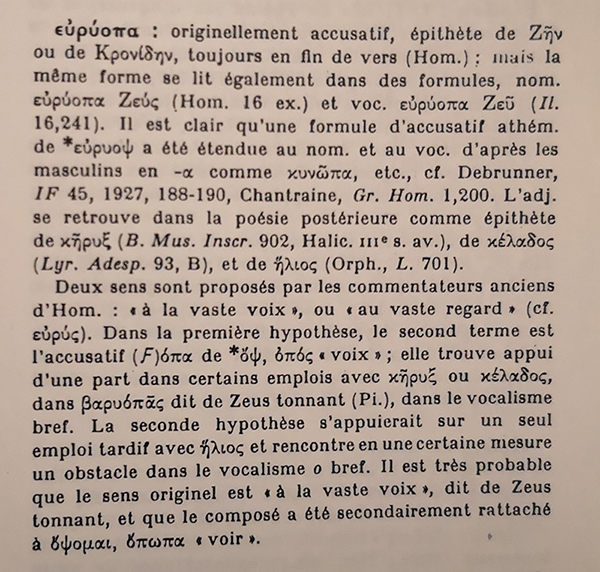I did some search, and it appears that this adjective has only the feminine form ἠρι-γένεια; could somebody please confirm?..
P.S. I would like to add a question regarding εὐρύοψ, οπος (Vocabulary, Lesson LXIX): I understand, from another dictionary, that the form εὐρύοψ is unattested. Is it worth maintaining it as *εὐρύοψ, or is it better to indicate it, within the scope of this manual, in its accusative/vocative form εὐρύοπα?..
I did some search, and it appears that this adjective has only the feminine form ἠρι-γένεια; could somebody please confirm?..
ἠριγένεια only appears in Homer as an epithet of Ἠώς, so there seems to be no attested masculine or neuter forms.
P.S. I would like to add a question regarding εὐρύοψ, οπος (Vocabulary, Lesson LXIX): I understand, from another dictionary, that the form εὐρύοψ is unattested. Is it worth maintaining it as *εὐρύοψ, or is it better to indicate it, within the scope of this manual, in its accusative/vocative form εὐρύοπα?..
I would have thought that its best to indicate the form found in a dictionary. Cunliffe has an entry for εὐρύοπα. He says this form is both the vocative and accusative form. He notes " Prob. orig. a voc. and turned into nom. and acc."
I think you should aim to make your presentation as simple as possible without confusing your neophyte reader with complications about theoretical but unattested forms.
εὐρύοπα is the nominative. It’s basically an indeclinable word that shows up next to Zeus in nom./voc./acc.
Thank you, Seneca and Joel.
P.S. By the way, the dictionary I had used in relation with εὐρύοπα is dictionaire étimologique de la langue greque of Pierre Chantraine.
